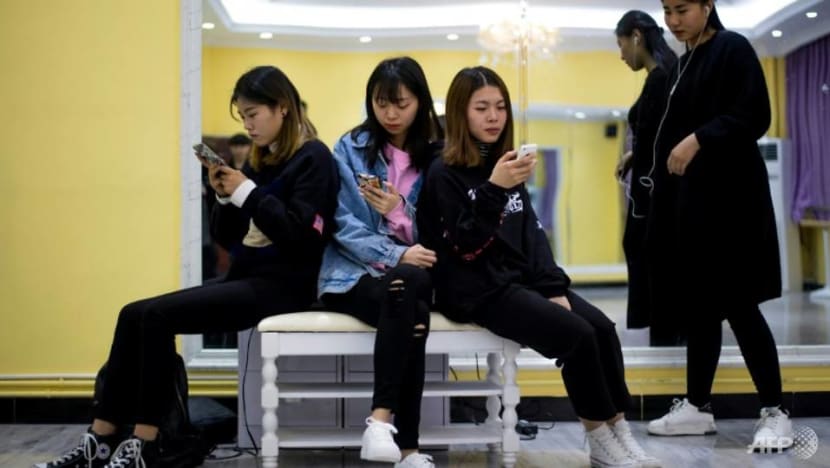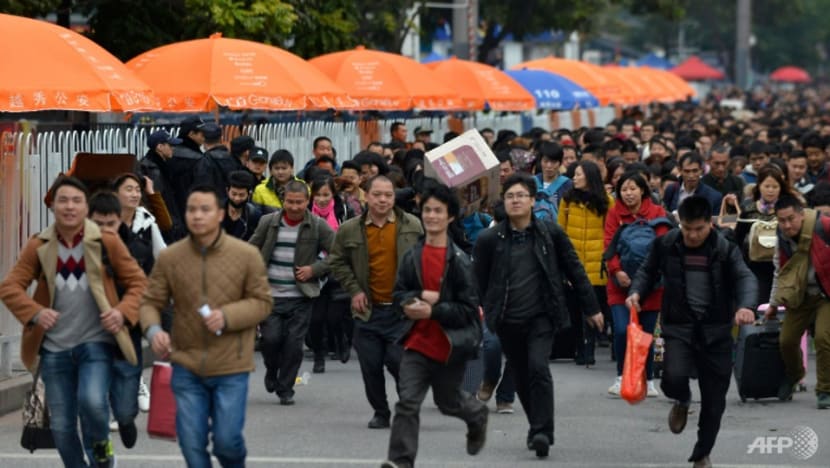Commentary: In China, authorities fear wanting to chill could fire off the next youth revolution
The art of lying flat – or “tang ping” – has fired up discussion boards and social media platforms and spooked the Chinese establishment. But embracing this change in thinking can light a new way forward for the country, says William Wan.

There is growing concern in China that long periods online is posing a serious threat to the country's youth. (Photo: AFP/Johannes Eisele)
SINGAPORE: In his speech at the Chinese Communist Party's grand centennial anniversary celebrations on Jul 1, President Xi Jinping called on Chinese citizens to “be prepared to work harder than ever before” to realise the goal of national rejuvenation.
He optimistically declared that “the future belongs to the young people, and our hopes also rest with them.”
But if you look at what’s going on in the minds of China’s youths today, Xi’s vision might not go down so easy. Instead of working harder than ever before, there is a growing youth counter-culture seeking to slow down and practise "tang ping" (躺平) – the art of lying flat.
A YEARNING FOR THE SIMPLE LIFE
First emerging in April 2021 when 31-year-old factory worker Luo Huangzhou decided to leave his job in pursuit of the simple life by travelling from Sichuan to Tibet and relying on odd jobs, tang ping gained traction after a photo posted by Luo went viral.
READ: Commentary: Chinese fashion giant Shein has taken over the world. It has just met its match
The term also made the rounds recently after a discussion board Tieba fired up chatter among netizens of doing less rather than more, being contented with the simple things in life and taking the time to unwind after each day.
Some advocates suggest taking a laissez faire approach towards money and career in eschewing material wealth and possession, while others say the movement is more accurately a call for moderation in a society of excesses.
The tang ping idea gained huge momentum across Chinese social media platforms Weibo, Internet forum Douban and more.
But the subject just as quickly caught the attention of authorities, who shut it down right away. Online discussion groups, some with up to 200,000 members, were censored, and Chinese media almost uniformly urged young people to ditch the idea.
An editorial in the Global Times declared: "China is at one of the most important stages of its long road to national rejuvenation. Young people are the hope of this country, and neither their personal situation nor the situation of this country will allow them to collectively 'lie flat'."
That curiously strong pushback by the Chinese establishment suggests some level of deep-seated concern, as if tang ping is some sort of a dangerous argument that must be put out. This seems unwarranted.
Then again polls suggest these attitudes are hardening. Between 28 May and 3 Jun, Weibo conducted a survey of 241,000 participants that found 61 per cent agreed the "lying flat" mindset resonated with them.
READ: Commentary: Vietnam's attitude towards Chinese vaccines is very telling
But this psyche is not new. Five years ago, China's People Daily ran a story about the first post-1990s generation group of young men who went on to become monks that went viral on WeChat in 2017.
These "Buddha-like youngsters" claimed to have "seen through the vanity of life" and became nonchalant towards life and livelihood as a result.

A PUSHBACK AGAINST 996
Observers attribute the resurgence of tang ping, this yearning for the simple life, to several socio-economic reasons. These include China's gruelling 996 work culture where caustic work competition at work, pressures to conform with an old narrative and keeping up with familial expectations have taken a toll on young working adults.
At the heart of it is the gap between aspirations and reality. As a 35-year-old Chinese woman, married with no children, told the South China Morning Post: "More working class like us have to work from 9am to 9pm, six days a week, but still can't afford a down payment [on a flat] or even the cost of having a child."
Paired with the disruption wrought by COVID-19, China's slowing economy and rising costs of living, Chinese youths have bought into the myth that success and happiness can be achieved with sufficient diligence yet find themselves having to run faster on the treadmill of life just to keep afloat.
When stresses overwhelm, tang ping can seem to be a reaction to the logical outcomes of a winner-takes-all society.
WIDER IMPLICATIONS
This retreat from the traditional markers of success has wider implications for China moving forward. Chinese millennials, born between 1981 and 1996, number more than 350 million. That's more than the entire population of the US.
READ: Commentary: Some soul-searching needed in China’s fresh push to make friends and influence people
But perhaps there is more than meets the eye. There are two ways of looking at tang ping.
The first is that with China's rise, Chinese parents may have achieved much of the criteria for material success.
This provides space for their children to pursue their passions and define success on their own terms, which may explain why netizens describe this phenomenon as a spiritual movement.
READ: Commentary: China's protest against long working hours is so old-fashioned

From this perspective, it is a transcendental philosophy leading one to opt out of the rat race and finding meaning in new, non-conventional endeavours that could lift society to new heights in sports, the arts and more.
The second interpretation is a defeatist one, where Chinese millennials have decided to check out because they cannot catch up. Tired and defeated, they've figured that since they can't win, they might as well not even try, and should simply lay back and enjoy themselves.
This argument that such attitudes smacks of entitlement seem to be the one most Chinese media commentators hold. They fear this movement is not good news for President Xi. His ambition of achieving the Chinese dream of national rejuvenation rests on the Chinese workforce becoming even more capable, productive and innovative.
There's a common saying that China needs to get rich before it gets old. China's rapidly greying population is its gravest domestic challenge. More than 200 million today are over 65 years of age and by 2049, a number that will more than double.
Meanwhile, the number of newborns in China in 2020 have come down to 12 million from 14.65 million in 2019. With the fertility rate of women of childbearing age at a relatively low level of 1.3, China needs every young person to be productive in more ways than one.
The Chinese establishment probably feels its youths cannot afford to let up in the face of a brewing US-China competition.
HEEDING THE CRIES
It is a pity that authorities see tang ping as a sort of counter-culture that needs putting down rather than a first sign of an enlightened approach that values work-life balance, mental wellness, and different pathways to success.
READ: Malaysia's US$1.8 billion mega project with China Railway falls through
It may well spell a necessarily different approach to defining the ideal life for the next generation of youths in China, at a turning point for the country when China's growth over the long term will slow.
Instead of stemming such views, Chinese leaders should heed this cry as a ground-up call from its young people speaking up on how they want to live their lives.
By addressing these concerns directly, and not sweeping it under the carpet, Chinese leaders could signal to their people these worries of being left behind have been heard.
And in China's efforts towards national rejuvenation, this could spell an alternative way for Chinese leaders to inspire the next generation of millennials to stand up and keep fighting. It could well become the engine in China's next phase of development.
Dr William Wan is General Secretary of the Singapore Kindness Movement.














